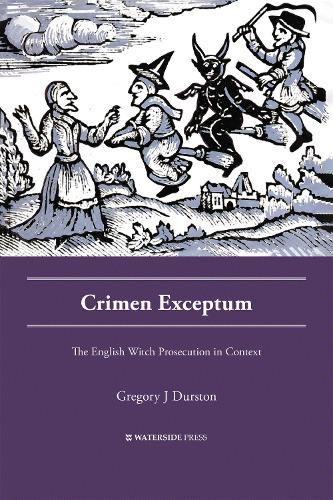Readings Newsletter
Become a Readings Member to make your shopping experience even easier.
Sign in or sign up for free!
You’re not far away from qualifying for FREE standard shipping within Australia
You’ve qualified for FREE standard shipping within Australia
The cart is loading…






This title is printed to order. This book may have been self-published. If so, we cannot guarantee the quality of the content. In the main most books will have gone through the editing process however some may not. We therefore suggest that you be aware of this before ordering this book. If in doubt check either the author or publisher’s details as we are unable to accept any returns unless they are faulty. Please contact us if you have any questions.
As the author notes, “The early-modern European witch-hunts were neither orchestrated massacres nor spontaneous pogroms. Alleged witches were not rounded up at night and summarily killed extra-judicially or lynched as the victims of mob justice. They were executed after trial and conviction with full legal process’.
In this concise but highly-informed account of the persecution of witches, Gregory Durston demonstrates what a largely ordered process was the singling-out or hunting-down of perceived offenders. How a mix of superstition, fear, belief and ready explanations for ailments, misfortune or disasters caused law, politics and religion to indulge in criminalisation and the appearance of justice. Bearing echoes of modern-day "othering’ and marginalisation of outsiders he shows how witchcraft became akin to treason (with its special rules), how evidentially speaking storms, sickness or coincidence might be attributed to conjuring, magic, curses and spells. All this reinforced by examples and detailed references to the law and practice through which a desired outcome was achieved.
In another resonance with modern-times the author shows how decisions were often diverted into the hands of witch-hunters, witch-finders (including self-appointed Witchfinder General, Matthew Hopkins), witch-prickers and other experts as well as the quaintly titled "cunning-folk’ consulted by prosecutors and "victims’. Crimen Exceptum (crimes apart).
A straightforward and authoritative guide. Shows the rise and fall of prosecutions. Backed by a wealth of learning and research.
$9.00 standard shipping within Australia
FREE standard shipping within Australia for orders over $100.00
Express & International shipping calculated at checkout
This title is printed to order. This book may have been self-published. If so, we cannot guarantee the quality of the content. In the main most books will have gone through the editing process however some may not. We therefore suggest that you be aware of this before ordering this book. If in doubt check either the author or publisher’s details as we are unable to accept any returns unless they are faulty. Please contact us if you have any questions.
As the author notes, “The early-modern European witch-hunts were neither orchestrated massacres nor spontaneous pogroms. Alleged witches were not rounded up at night and summarily killed extra-judicially or lynched as the victims of mob justice. They were executed after trial and conviction with full legal process’.
In this concise but highly-informed account of the persecution of witches, Gregory Durston demonstrates what a largely ordered process was the singling-out or hunting-down of perceived offenders. How a mix of superstition, fear, belief and ready explanations for ailments, misfortune or disasters caused law, politics and religion to indulge in criminalisation and the appearance of justice. Bearing echoes of modern-day "othering’ and marginalisation of outsiders he shows how witchcraft became akin to treason (with its special rules), how evidentially speaking storms, sickness or coincidence might be attributed to conjuring, magic, curses and spells. All this reinforced by examples and detailed references to the law and practice through which a desired outcome was achieved.
In another resonance with modern-times the author shows how decisions were often diverted into the hands of witch-hunters, witch-finders (including self-appointed Witchfinder General, Matthew Hopkins), witch-prickers and other experts as well as the quaintly titled "cunning-folk’ consulted by prosecutors and "victims’. Crimen Exceptum (crimes apart).
A straightforward and authoritative guide. Shows the rise and fall of prosecutions. Backed by a wealth of learning and research.